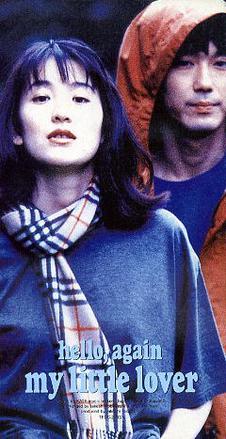Yuki Kuramochi, known professionally as Yuki, is a Japanese musician and singer-songwriter. She is best known as the lead vocalist for Judy and Mary. She founded Judy and Mary in 1991 and became a solo artist in 2002. She has also been a member of the bands NiNa and Mean Machine.

The discography of Japanese R&B singer Misia consists of nine studio albums, three compilation albums, one extended play (EP), one live album, six remix albums, twenty-six singles, twelve promotional singles, eighteen video albums and thirty-seven music videos. In 1997, Misia signed a recording contract with BMG Japan and joined the then up-and-coming talent agency, Rhythmedia. Under the sub-label Arista Japan, Misia released her first single, "Tsutsumikomu Yō ni..." in February 1998, followed by "Hi no Ataru Basho" in May. In June, her debut album, Mother Father Brother Sister, opened at number three on the Oricon chart. The album peaked at number one three weeks later and stayed in the top five for eleven consecutive weeks. Mother Father Brother Sister was certified double million and won a Japan Record Award for Best Album, as well as a Japan Gold Disc Award for Pop Album of the Year. In 2000, Misia's second studio album, Love Is the Message, debuted at number one and was certified double million. It won a Japan Record Award for Best Album and a Japan Gold Disc Award for Pop Album of the Year. The album spawned three top ten hits: "Believe," "Wasurenai Hibi" and "Sweetness." Misia's first remix album, Misia Remix 2000 Little Tokyo, was released three months later and shot to number one. It sold over 800,000 copies and is the second best-selling remix album of all time in Japan.

The discography of Mika Nakashima includes 11 studio albums, 7 compilation albums, 45 singles and 20 video albums. These have all been released through Sony Music Entertainment Japan.
The discography of Ayaka consists of six studio albums, two compilation albums, a cover album and numerous singles, released through Warner between 2006 and 2009, and through Ayaka's independent label, A Station, from 2012 onwards.

"Prisoner of Love" is Hikaru Utada's 21st Japanese single and 30th single overall, released on May 21, 2008. This was her first Japanese recut single in nine years, after the first one "First Love" in 1999. It is also her first single to be released only in CD+DVD format. "Prisoner of Love" serves as the insert song for the Japanese television drama, Last Friends, while the original version is used in the opening theme. It won the Best Theme Song Award in the 57th Drama Academy Awards. "Prisoner of Love" was the 3rd most downloaded song in Japan during 2008.
This is the discography for Japanese boy band KAT-TUN.
Japanese boy band NEWS has released thirteen studio albums, one compilation album, twenty-six singles, and ten concert videos.

Ayaka's History 2006–2009 is Ayaka's first compilation album, released on September 23, 2009. The album was released in three versions: 2CD+DVD (limited), 2CD+Photo book (limited) and a regular one disc edition.

"Hello, Again " is a song by Japanese band My Little Lover. It was released as a single on August 21, 1995, and is currently the band's biggest hit single.

"Hotaru/Shōnen" is the twenty-sixth single by Japanese artist Masaharu Fukuyama. It was released on 11 August 2010.

"Kimi tte" is a song by Japanese pop singer Kana Nishino. It was released as her 12th single on November 3, 2010. The song was marketed as a "heart-warming tender" mid-tempo ballad in the initial press release, also describing the lyrics, as being about "scaling up passion to love."
The discography of Monkey Majik consists of thirteen studio albums, five compilation albums and numerous singles and digital downloads. The band's releases were originally self-released in Sendai, after which they were signed to independent label and management Under Horse Records, and released material through there between 2004 and 2005. In 2005, Monkey Majik were signed to major label Avex Entertainment, and continue to release under the Binyl Records sub-label.

The discography of Japanese model-singer Kyary Pamyu Pamyu consists of five studio albums, one extended play, ten singles and six video albums. Kyary Pamyu Pamyu debuted in 2011 under Warner Music Japan sublabel Unborde, as a musician produced by Yasutaka Nakata of the electronic duo Capsule. Kyary Pamyu Pamyu's albums have been released globally, with her seeing international success in Belgium, South Korea and Taiwan.
The discography of Tokyo Jihen consists of five studio albums, three compilation albums, one regular release extended play and three vinyl exclusive extended plays and 13 video releases, released through Toshiba EMI, EMI Music Japan and Universal between 2004 and 2013.

The discography of Japanese-American musician Beni consists of eight studio albums, two compilation albums, six live albums and three cover albums and twenty-six singles. Beni debuted in 2003 as a member of the Pony Canyon idol group Bishōjo Club 21 under the name Beni Arashiro, and in 2004 made her solo debut with Avex Trax.
The discography of Japanese pop group AAA includes eleven studio albums, six extended plays, seven compilation albums, eight live albums, one cover album, three remix albums, and 52 singles. All of the group's releases have been with Avex Trax, a subsidiary of Avex Group.
The discography of Japanese singer-songwriter Kazumasa Oda consists of ten studio albums, four compilation albums, two cover albums, three video albums, and thirty solo singles. Oda began his career as a performer of the folk-rock band Off Course. He began releasing solo material in 1985. His 1991 single "Oh! Yeah!" / "Love Story wa Totsuzen ni" topped the Oricon Singles Chart and was certified two-times million by the Recording Industry Association of Japan (RIAJ). When his 2016 compilation album Ano Hi Ano Toki topped the Oricon Albums Chart, Oda became the oldest artist in the country to achieve the accomplishment.

Thank You, Love is the third studio album by Japanese singer and songwriter Kana Nishino. It was released on June 22, 2011. Nishino acted as the album's primary lyricist, as she had on all of her preceding albums. Thank you, Love was created with the concept of a "warm album" and reflects Nishino's desire to create a work that includes positive elements. Thank you, Love marked new lyrical directions for Nishino: while LOVE one. and to LOVE were solely centered on songs about romance, this work is unique in that it expresses things other than that.

Enka is the enka covers album by Japanese singer Akina Nakamori. It was released on 27 June 2007 under Universal Music Japan. It is Nakamori's fourth covers album.











